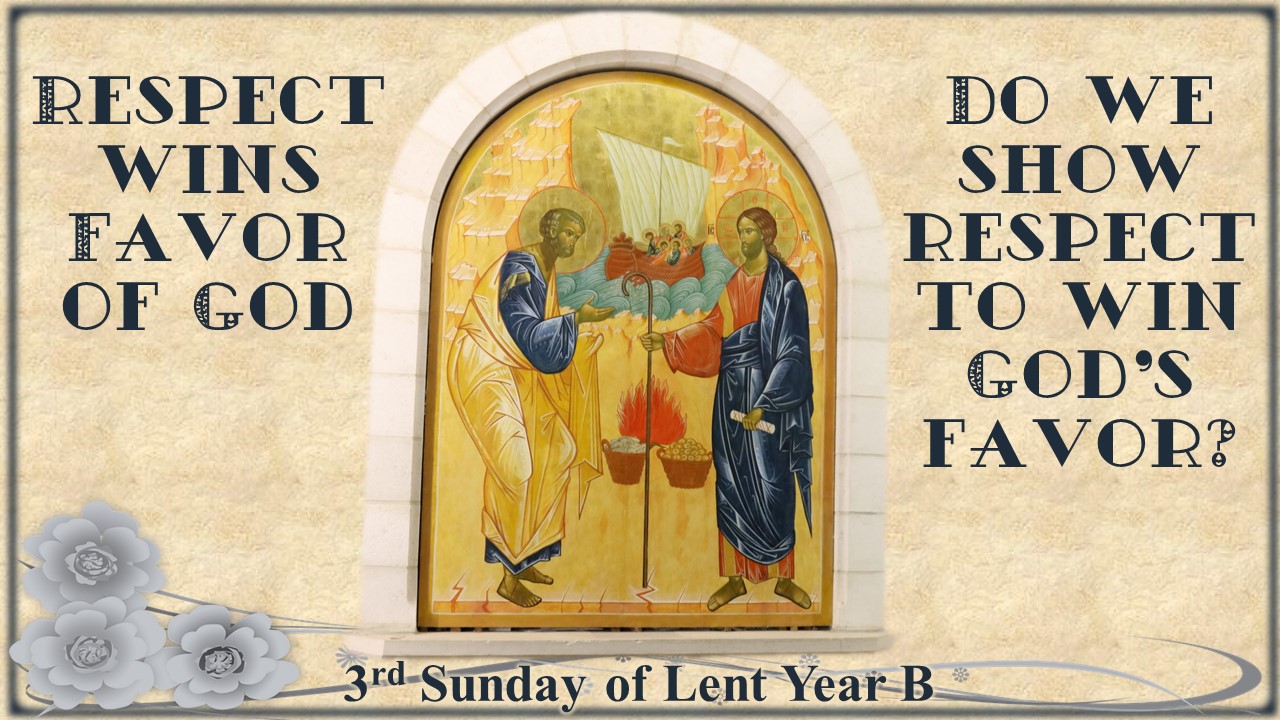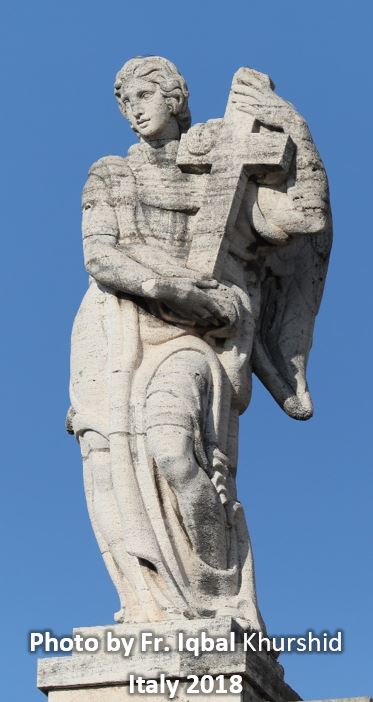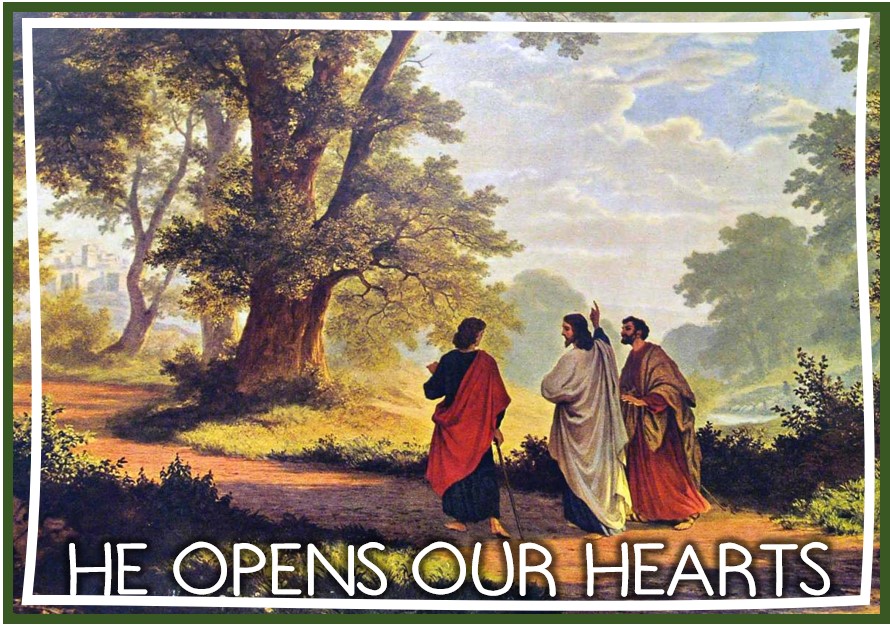
3rd Sunday of Lent – Year B ~ March 3, 2024
RESPECT WINS FAVOUR OF GOD
In our day-to-day life we try our level best to show respect to everyone and everything whether it is people, animals, or places, and in return we hope to have the same. We do believe by showing our respect to others, we learn to accept them. Just imagine if there was no respect and acceptance left in the world, what would happen? To highlight the title of my reflection, the following story will help us to understand why respect is important.
Once upon a time, in city, a certain calf was born and a Rich Old Man bought the calf and being very fond of the gentle animal, named him ‘Delightful’. The Rich Old Man took good care of Delightful and fed him only the best. When Delightful grew up into a big fine strong bull, he thought, “I was brought up by this generous man. He gave me good food and constant care, even in difficult times. Now I am a big bull, I would like to use my strength to give something in return to my Master”.
So Delightful said to the Rich Old Man, “Sir, please find some wealthy merchant who is proud of having many strong bulls. Challenge him by saying that your bull can pull one hundred heavily loaded bullock carts.”
The next day, the Rich Old Man struck up a conversation with a proud merchant. In a while, he brought up the topic of who had the strongest bull in the city. The merchant said, “Many have bulls, but no one has any as strong as mine.”
The Rich Old Man said, “Sir, I have a bull who can pull one hundred heavily loaded bullock carts.”
“No friend, how can there be such a bull? That is unbelievable!” said the merchant. The other replied, “I do have such a bull, and I am willing to make a bet.” The merchant said, “I will bet a thousand gold coins that your bull cannot pull a hundred loaded bullock carts.” So, the bet was made, and they agreed on a date and time for the challenge.
On the day of the challenge, the proud merchant attached together one hundred big bullock carts. He filled them with sand and gravel to make them very heavy. The Rich Old Man fed the finest rice to the bull called Delightful. He bathed him and decorated him and hung a beautiful garland of flowers around his neck. Then he harnessed Delightful to the first cart and climbed up onto it.
Amidst his sudden popularity, the Rich Old Man could not resist the urge to make himself seem very important. So, he cracked a whip in the air, and yelled at the faithful bull, “Pull, you dumb animal! I command you to pull, you big dummy!”
The bull called Delightful thought, “This challenge was my ideal. I have never done anything bad to my master, and yet he insults me with such harsh words!” So Delightful remained in his place and refused to pull the carts. The proud merchant laughed and demanded his winnings from the bet. The Rich Old Man had to pay him the one thousand gold coins. He returned home and sat down, saddened by his loss.
Delightful grazed peacefully on his way home. When he arrived, he saw his Master sadly lying on his side. He asked, “Sir, why are you lying there like that? Are you fine?” The man said, I lost a thousand gold coins because of you. With such a loss, how could I be fine?” The bull replied. “Sir, you called me ‘dummy’. You even cracked a whip in the air over my head. In all my life, did I ever break anything, step on anything, make a mess in the wrong place, or behave like a ‘dummy’ in any way?”
Rich Old Man answered, “No, my pet.” Delightful said, “Then Sir, why did you call me ‘dumb animal’, and insulted me though I have done nothing wrong? But now I feel sorry for you, so please go again to the merchant, and make the same bet for two thousand gold coins. And remember to use only the respectful words.”
So, the Rich Old Man went back to the merchant and made the bet for two thousand gold coins. The proud merchant thought it would be easy money. Again, he set up the one hundred heavily loaded bullock carts. Again, the Rich Old Man fed and bathed the bull, and hung a garland of flowers around his neck.
When all was ready, the rich man touched Delightful’s forehead with a lotus blossom, having given up the whip. Thinking of him as fondly as if he were his own child, he said, “My son, please do me the honour of pulling these one hundred bullock carts.”
Low and behold, the wonderful bull pulled with all his might and dragged the heavy carts, until the last one stood in the place of the first. The merchant, with his mouth hanging open in disbelief, had to pay the two thousand gold coins. The onlookers were so impressed that they honoured the bull called Delightful with gifts. But even more important to the Rich Old Man than his winnings, was his valuable lesson in humility and respect.
In our journey of Lent, we have started by learning respect and accepting Jesus’ sacrifice with humility? If we recall the readings of the previous Sundays, we can find ourselves deep rooted in the spirit of Lent. On the First Sunday of Lent, we reflected on the Temptation of Jesus and beginning of his public ministry which started with the words “The time is fulfilled, believe and repent for the Kingdom of God is near”. And the Last Sunday’s Sacred Scripture invited us to open our hearts and minds to reflect and meditate on the great mystery of Jesus’ transfiguration. During that period, we contemplated also on the excitement of St. Peter who said “Rabbi, it is good to be here. We will build three dwellings….”. Encouraging that every day or every week we can be with the Lord during the celebration of the Holy Mass. St. Augustine says “Lord, I have cried to you, hear me. This is a prayer we can all say. This is not my prayer, but that of the whole body of Christ. Rather, it is said in the name of his body. When Christ was on earth he prayed in his human nature and prayed to the Father in the name of his body, and when he prayed drops of blood flowed from his whole body. It is written in the Gospel: Jesus prayed with earnest prayer, and sweated blood. What is this blood streaming from his whole body but the martyrdom of the whole Church?
Lord, I have cried to you, hear me; listen to the sound of my prayer, when I call upon you. Did you imagine that crying was over when you said: I have cried to you? You have cried out, but do not yet feel free from care. If anguish is at an end, crying is at an end; but if the Church, the body of Christ, must suffer anguish until the end of time, it must not say only: I have cried to you, hear me; it must also say: Listen to the sound of my prayer, when I call upon you. Let my prayer rise like incense in your sight; let the raising of my hands be an evening sacrifice. This is generally understood of Christ, the head, as every Christian acknowledges. When day was fading into evening, the Lord laid down his life on the cross, to take it up again; he did not lose his life against his will. Here, too, we are symbolized. What part of him hung on the cross if not the part he had received from us? How could God the Father ever cast off and abandon his only Son, who is indeed one God with him? Yet Christ, nailing our weakness to the cross (where, as the Apostle says: Our old nature was nailed to the cross with him), cried out with the very voice of our humanity: My God, my God, why have you forsaken me? The evening sacrifice is then the passion of the Lord, the cross of the Lord, the oblation of the victim that brings salvation, the holocaust acceptable to God. In his resurrection he made this evening sacrifice a morning sacrifice. Prayer offered in holiness from a faithful heart rises like incense from a holy altar. Nothing is more fragrant than the fragrance of the Lord. May all who believe share in this fragrance. Therefore, our old nature, in the words of the Apostle, was nailed to the cross with him in order, as he says, to destroy our sinful body, so that we may be slaves to sin no longer”.
Today on this Third Sunday of Lent we are not only shown the true spirit of the Law but also the disrespectful behaviour towards the Temple. In the First reading we see that people of Israel are given commandments of God by Moses. These laws are the core of moral life of everyone who believes in God alone. These commandments help everyone to be strong in their spiritual journey of Lent.
The journey of Lent is all about the Holy Cross. We strongly believe that the Holy Cross is a source of our salvation and redemption because our Saviour died on the Cross to save and give us eternal life. St. Paul rightly says in the Second Reading “The message about the Cross is foolishness to those who are perishing, but to us who are being saved it is the power of God”. Every time when we participate in the Station of the Cross, we always repeat these words “We adore You, O Christ, and we praise You. Because, by Your holy cross, You have redeemed the world”. People make their own understanding of Cross, but St. Paul says, “For God’s foolishness is wiser than human wisdom, and God’s weakness is stronger than human strength”.
In the Gospel today we see the human side of Jesus who is upset with people who disrespectful toward the Holy Temple. He makes the cord and drove everyone out of the Temple who were using Temp for mere profits and told them “Take these things out of here! Stop making my Father’s house a marketplace!” This is the beginning of the real teaching which will come later as people will demand a sign from him. Holy Father Pope Francis’ reflection on this Gospel very inspiring as he says “Today’s Gospel presents the episode of the expulsion of the merchants from the temple. Jesus made “a whip of cords, he drove them all, with the sheep and oxen, out of the temple”, the money, everything. Such a gesture gave rise to strong impressions in the people and in the disciples. It clearly appeared as a prophetic gesture, so much so that some of those present asked Jesus: “What sign have you to show us for doing this?”, who are you to do these things? Show us a sign that you have authority to do them. They were seeking a divine and prodigious sign that would confirm that Jesus was sent by God. And He responded: “Destroy this temple, and in three days I will raise it up”. They replied: “It has taken 46 years to build this temple, and you will raise it up in three days?”. They did not understand that the Lord was referring to the living temple of his body, that would be destroyed in the death on the Cross but would be raised on the third day. Thus, in three days. “When therefore he was raised from the dead, his disciples remembered that He had said this; and they believed the Scripture and the word Jesus had spoken”.
This is also very interesting to see what people are selling because all those became part of Jesus’ life later. The doves were offered for his purification which is the symbol of peace and Jesus is Prince of Peace. The sheep bring us to the point of reflecting on the qualities of Good Shepherd who laid his life for his sheep. The money was taken from the Temple by Judas Iscariot to betray Jesus and again thrown on the floor of the Temple by him when he came to know about his betrayal of Jesus. Furthermore, we can also meditate on the fact these things also represent the worldly attachments and evils which can destroy our lives.
Jesus cares about us and he does not want the Temple of our body to be polluted by the corruption of the evil but kept safe and pure from the poison of sin. St. Paul writing his Letter to Ephesians says “Finally, be strong in the Lord and in the strength of his power. Put on the whole armor of God, so that you may be able to stand against the wiles of the devil. For our struggle is not against enemies of blood and flesh, but against the rulers, against the authorities, against the cosmic powers of this present darkness, against the spiritual forces of evil in the heavenly places. Therefore, take up the whole armor of God, so that you may be able to withstand on that evil day, and having done everything, to stand firm. Stand therefore, and fasten the belt of truth around your waist, and put on the breastplate of righteousness. As shoes for your feet put on whatever will make you ready to proclaim the gospel of peace. With all of these, take the shield of faith, with which you will be able to quench all the flaming arrows of the evil one. Take the helmet of salvation, and the sword of the Spirit, which is the word of God”.
Jesus wants us to be respectful to God’s commandments and never go against them. He suffered and died for us to save us. He wants us to come to him for forgiveness and healing because if we have died with him, we will also rise with him as well.
He does not need our human testimony, but he is Divine who has the power to know us in and out. He is always standing and knocking at the door to call us to follow him and to be saved. St. Augustine writes “Let us do now what he commands. Let us follow in the footsteps of the Lord. Let us throw off the chains that prevent us from following him. Who can throw off these shackles without the aid of the one addressed in these words: You have broken my chains? Another psalm says of him: The Lord frees those in chains, the Lord raises up the downcast”.
Once there was a blind man who lived in a small town. He lived alone all by himself. He always carries a lamp with him. One day he was passing by the street when a group of young travelers saw him with a lamp. They started to make fun of the blind man. One of them started laughing saying, “Hey look at the blind man with the lamp.” The man heard it and replied to the young travelers, “I am carrying this lamp not for myself, it’s for people like you who can see but don’t notice me that I’m blind unless I’m carrying this lamp and pushing me in a hurry.” The young travelers felt ashamed of their behavior. They apologized to the blind man.
Do we show respect to win God’s favour?
Other Sermons In This Series

6th Sunday in Ordinary Time Year C – February 13, 2022
February 11, 2022

6th Sunday in Ordinary Time Year A ~ February 12, 2023
February 10, 2023

3nd Sunday of Easter Year A ~ April 23, 2023
April 21, 2023

